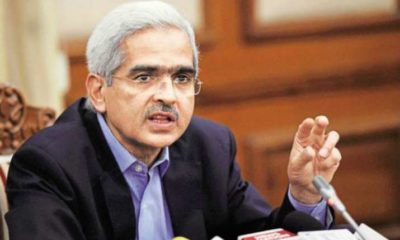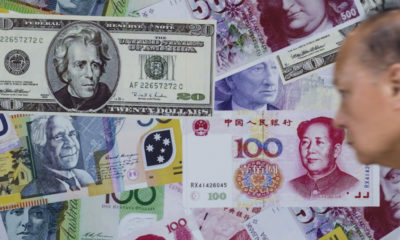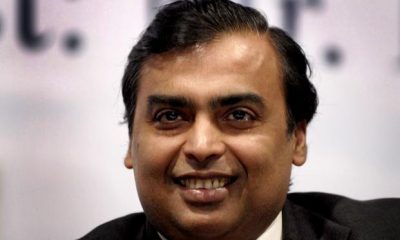World
IMF chief warns of risk looming in global economic growth

Washington: International Monetary Fund (IMF) managing director Christine Lagarde said the global economy is approaching closer to a “new mediocre” scenario — the risk of low growth for a long time.
In the curtain-raising speech on Wednesday for the IMF-World Bank annual meetings, Lagarde expected that global growth will likely be weaker this year than last, with only a modest acceleration expected in 2016, given the disappointing and uneven growth of the world economy, as per reported.
The IMF is expected to downgrade its outlook for the global economy in its flag-ship report World Economic Outlook, which will be released at the annual meetings in Peru next week.
In July, the IMF cut its forecast for the global growth this year by 0.2 percentage point to 3.3 percent and expected the global economy to grow 3.8 percent next year.
According to Lagarde, the advanced economies will see modest pickup in growth, while the emerging economies are likely to see their growth rates falling for the fifth consecutive year.
The IMF chief said that the prospect of rising interest rates in the US and the slowdown of China’s economy are contributing to uncertainty and higher market volatility and are heavily affecting the global economic outlook.
She called on commodity exporters to prepare for a prolonged period of low commodity prices in view of China rebalancing from commodity-intensive investment driven model to consumption and service-focused growth.
As the US Federal Reserve is poised to raise interest rates for the first time in nine years, economies, especially emerging economies, would need to improve their capacity to buffer shocks and enhance the monitoring of foreign currency exposures of major companies, said Lagarde.
World
Lockdowns in China Force Urban Communities to Defy Censorship and Vent Frustration Online

Shanghai’s rich middle class is leading a wave of online dissent over the strict and prolonged lockdowns imposed in various parts of the country. Chinese internet censorship is struggling as patience is wearing thin in many urban centers, coming up with creative forms of online protests.
Social Media Posts Revealing Lockdown Tension in Shanghai
Drawn-out lockdowns are nothing new in China as authorities insist with the nation’s zero-Covid policy since the start of the pandemic. Currently over This time around, however, metropolitan areas like Shanghai are increasingly difficult to keep quiet, given that its more than 25 million residents have seen weeks of total isolation along with food shortages and many other service interruptions.
Dozens of towns and reportedly over 300 million Chinese citizens have been affected by lockdowns of different severity. As expected, urban netizens have been most outspoken over their difficulties by finding creative ways to get around state censorship and bans placed on topics, news comments and spontaneous campaigns.
Shanghai residents have been using mobile proxies and hijacking seemingly unrelated hashtags to talk about healthcare issues, delivery failures and the overall severity of their situation. The “positive energy” that the Chinese government wants to transmit during the recent prolonged series of lockdowns does not come naturally to those counting food supplies and online censors are working hard to filter words, trending topics and undesired social media sharing.
WeChat groups and message threads are under constant monitoring. Posts questioning the zero-Covid approach have been quickly deleted, including by leading Chinese health experts like Dr. Zhong Nanshan. Video footage is soon censored and protests and investigations are quickly made to disappear.
Where this has not worked, officials have exposed banners with warnings and outright threats like “watch your own mouth or face punishment”, while drones have been patrolling the city skies. Yet, if anything, this has led to further tensions and unspoken confrontation with Shanghai’s educated and affluent middle class.
Creative Online Solutions Harnessing Civic Energy
Announcements by Chinese social media that they would be publishing the IP addresses of users who “spread rumors” have not helped either. Tech industry research has shown that much of Asia’s tech-savvy population has a habit of using mobile proxies and other privacy tools, quickly finding workarounds to browse the internet freely and talk to the world about the hottest topics.
The sheer volume of forbidden posts is already a challenge for the very censorship system, experts explain. Unable to track all trending hashtags, state workers overlook topics that speak about the US, Ukraine or other popular news. Linking human rights elsewhere to their situation, Chinese online dissidents establish their informal channels and “hijack” the conversation to share personal or publicly relevant information about the Covid suppression in their town.
Sarcastic and satirical posts still dominate. Others hope to evade the censors by replacing words from famous poems or the national anthem. One thing is certain – social media, when harnessed with the right creativity, has proven its ability to mount pressure on the government in even some of the most strictly controlled tech environments like China.























